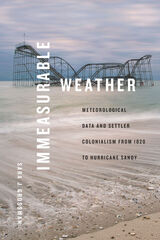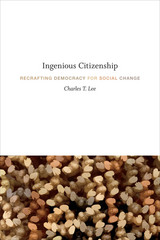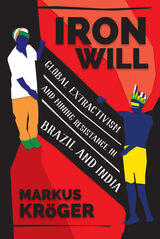115 books about Citizen participation and 3
start with I
115 books about Citizen participation and 3
115 books about Citizen participation
3 start with I start with I
3 start with I start with I

Immeasurable Weather
Meteorological Data and Settler Colonialism from 1820 to Hurricane Sandy
Sara J. Grossman
Duke University Press, 2023
In Immeasurable Weather Sara J. Grossman explores how environmental data collection has been central to the larger project of settler colonialism in the United States. She draws on an extensive archive of historical and meteorological data spanning two centuries to show how American scientific institutions used information about the weather to establish and reinforce the foundations of a white patriarchal settler society. Grossman outlines the relationship between climate data and state power in key moments in the history of American weather science, from the nineteenth-century public data-gathering practices of settler farmers and teachers and the automation of weather data during the Dust Bowl to the role of meteorological satellites in data science’s integration into the militarized state. Throughout, Grossman shows that weather science reproduced the natural world as something to be measured, owned, and exploited. This data gathering, she contends, gave coherence to a national weather project and to a notion of the nation itself, demonstrating that weather science’s impact cannot be reduced to a set of quantifiable phenomena.
[more]

Ingenious Citizenship
Recrafting Democracy for Social Change
Charles T. Lee
Duke University Press, 2016
In Ingenious Citizenship Charles T. Lee centers the daily experiences and actions of migrant domestic workers, sex workers, transgender people, and suicide bombers in his rethinking of mainstream models of social change. Bridging cultural and political theory with analyses of film, literature, and ethnographic sources, Lee shows how these abject populations find ingenious and improvisational ways to disrupt and appropriate practices of liberal citizenship. When voting and other forms of civic engagement are unavailable or ineffective, the subversive acts of a domestic worker breaking a dish or a prostitute using the strategies and language of an entrepreneur challenge the accepted norms of political action. Taken to the extreme, a young Palestinian woman blowing herself up in a Jerusalem supermarket questions two of liberal citizenship's most cherished values: life and liberty. Using these examples to critically reinterpret political agency, citizenship practices, and social transformation, Lee reveals the limits of organizing change around a human rights discourse. Moreover, his subjects offer crucial lessons in how to turn even the worst conditions and the most unstable positions in society into footholds for transformative and democratic agency.
[more]

Iron Will
Global Extractivism and Mining Resistance in Brazil and India
Markus Kröger
University of Michigan Press, 2020
Iron Will lays bare the role of extractivist policies and efforts to resist these policies through a deep ethnographic exploration of globally important iron ore mining in Brazil and India. Markus Kröger addresses resistance strategies to extractivism and tracks their success, or lack thereof, through a comparison of peaceful and armed resource conflicts, explaining how different means of resistance arise. Using the distinctly different contexts and political systems of Brazil and India highlights the importance of local context for resistance. For example, if there is an armed conflict at a planned mining site, how does this influence the possibility to use peaceful resistance strategies? To answer such questions, Kröger assesses the inter-relations of contentious, electoral, institutional, judicial, and private politics that surround conflicts and interactions, offering a new theoretical framework of “investment politics” that can be applied generally by scholars and students of social movements, environmental studies, and political economy, and even more broadly in Social Scientific and Environmental Policy research.
By drawing on a detailed field research and other sources, this book explains precisely which resistance strategies are able to influence both political and economic outcomes. Kröger expands the focus of traditionally Latin American extractivism research to other contexts such as India and the growing extractivist movement in the Global North. In addition, as the book is a multi-sited political ethnography, it will appeal to sociologists, political scientists, anthropologists, geographers, and others using field research among other methods to understand globalization and global political interactions. It is the most comprehensive book on the political economy and ecology of iron ore and steel. This is astonishing, given the fact that iron ore is the second-most important commodity in the world after oil.
By drawing on a detailed field research and other sources, this book explains precisely which resistance strategies are able to influence both political and economic outcomes. Kröger expands the focus of traditionally Latin American extractivism research to other contexts such as India and the growing extractivist movement in the Global North. In addition, as the book is a multi-sited political ethnography, it will appeal to sociologists, political scientists, anthropologists, geographers, and others using field research among other methods to understand globalization and global political interactions. It is the most comprehensive book on the political economy and ecology of iron ore and steel. This is astonishing, given the fact that iron ore is the second-most important commodity in the world after oil.
[more]
READERS
Browse our collection.
PUBLISHERS
See BiblioVault's publisher services.
STUDENT SERVICES
Files for college accessibility offices.
UChicago Accessibility Resources
home | accessibility | search | about | contact us
BiblioVault ® 2001 - 2024
The University of Chicago Press









